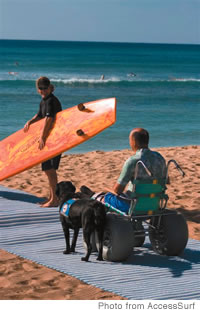Making The Ocean Accessible
Interviewed by Melissa Moniz
Wednesday - December 02, 2009
E-mail this story | Print this page | Comments (0) | Archive
 Del.icio.us Share
Del.icio.us Share

Dr. Amendeep Somal
Medical director of the spinal cord injury rehabilitation program at REHAB
Can you talk about what you do at REHAB?
I am the medical director of the spinal cord injury program, but as a physiatrist I take care of patients who have injuries or illnesses that result in a disability. Once they are medically stable, they come to REHAB for an average of two to four weeks. I work with a team of nurses and therapists, and we get them to their highest level of functioning and adapted to their new disability. We make sure that they have all the equipment they need, and we do patient/family training prior to their return home. We also help with their transition back into the community and doing things that they used to do, like recreational sports, hobbies, etc.
You also are a founder ofAccessSurf. Can you discuss why you and the other co-founders decided to start the organization?
While working with the spinal cord injury patients, we realized that a lot of our patients weren’t able to go to the beach - whether they weren’t able to get across the sand or get in and out of the water. So we decided that we needed to figure out how to make the beaches more accessible for people with disabilities, whether they are in a wheelchair or have a walker. Two of the recreational therapists I work with and a friend of ours who is a paraplegic decided to start a program for adapted surfing. We established our nonprofit status, and have been asking for volunteers and donations. The three-year mark for the Day at the Beach program was Nov. 7. The program is offered every month, it’s free and it’s open to anyone with a disability. Participants come out, they bring their families and are able to talk to other people who may have gone through a similar experience with their injury, and they are able to enjoy the beach and learn how to surf. Some of the people haven’t been into the ocean since they were injured. A lot of them think they can’t do it anymore, but we want to show them that, with the right equipment and the right training, you can still go back out there to surf and swim.
What’s the criteria?
There isn’t any. Because there’s such a need for it, we want to make it accessible for everyone. We have therapists, nurses and lots of dedicated volunteers come out every month. All the volunteers go through a training program, and we want to make it easy for people to come out and enjoy the beach. We provide all the equipment that they need: beach wheelchairs, modified surfboards, life jackets. The goal is to teach them how to do this so they don’t have to wait until the first Saturday of every month for our program. We have surf and swim instructors who provide as much help as they need in the water. It’s held at White Plains Beach. It’s a free program that’s open to everyone.

|
What is it about water, the ocean and surfing that’s therapeutic?
It’s a huge part of the local culture. Most people grew up with it, and not being able to experience that anymore because of an injury can be really hard. Essentially we’re trying to level the playing field for a lot of them. Someone with a spinal cord injury can get in the ocean and it doesn’t matter if they can’t walk, they can get on a surfboard and catch waves just as well as an able-bodied person.
Because gravity is eliminated in the water, the patients are able to do more even if they have limited strength. It gives them back some of their independence.
Is AccessSurf looking for volunteers?
Yes. Over the past three years more than 400 volunteers have participated in the program at some capacity, and we are always looking for more help. There is a volunteer training class held on the last Wednesday of every month here at REHAB Hospital. I’m the one who usually teaches that class, and it’s about two hours long. We go over what we expect the volunteers to do, and I also talk a little about working with people with disabilities so they have an idea of what to expect.
Do you feel there’s still a need for more types of therapeutic programs such as AccessSurf?
We’ve had such a good response to AccessSurf that we are thinking of opening it up further and doing things like kayaking, paddling and other types of water sports. But getting the equipment - all of which has to be custom-made - gets pretty expensive. Right now the entire program runs on donations and volunteer efforts. If we can raise more money and have more people volunteer their time, then we can expand.
E-mail this story | Print this page | Comments (0) | Archive
Most Recent Comment(s):













